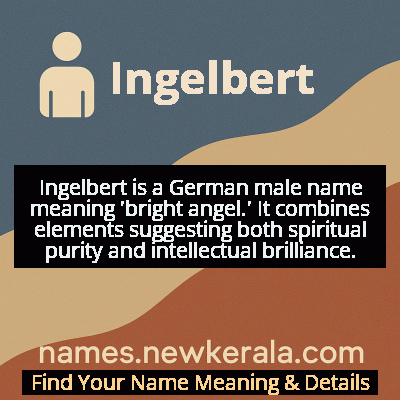Ingelbert Name Meaning & Details
Origin, Popularity, Numerology Analysis & Name Meaning of Ingelbert
Discover the origin, meaning, and cultural significance of the name INGELBERT. Delve into its historical roots and explore the lasting impact it has had on communities and traditions.
Name
Ingelbert
Gender
Male
Origin
German
Lucky Number
2
Meaning of the Name - Ingelbert
Ingelbert is a German male name meaning 'bright angel.' It combines elements suggesting both spiritual purity and intellectual brilliance.
Ingelbert - Complete Numerology Analysis
Your Numerology Number
Based on Pythagorean Numerology System
Ruling Planet
Moon
Positive Nature
Diplomatic, friendly, artistic, empathetic.
Negative Traits
Over-sensitive, moody, indecisive, prone to self-pity.
Lucky Colours
Green, cream, white.
Lucky Days
Monday.
Lucky Stones
Pearl, moonstone.
Harmony Numbers
1, 3, 4.
Best Suited Professions
Diplomats, mediators, caregivers, artists.
What People Like About You
Cooperative spirit, friendliness, artistic talent.
Famous People Named Ingelbert
Ingelbert I
Frankish noble
Count of Hesbaye and ancestor of Charlemagne's dynasty
Ingelbert II
Frankish count
Count of Hesbaye and prominent figure in Carolingian administration
Ingelbert of Bremen
Clergyman
Bishop of Bremen known for his ecclesiastical reforms
Ingelbert Humperdinck
Composer
German composer famous for his opera 'Hänsel und Gretel'
Name Variations & International Equivalents
Click on blue names to explore their detailed meanings. Gray names with will be available soon.
Cultural & Historical Significance
Extended Personality Analysis
People named Ingelbert are typically associated with a personality that balances intellectual depth with moral integrity. The 'bright' aspect of the name suggests individuals who are intellectually curious, analytical, and possess strong problem-solving abilities. They tend to approach situations with clarity and logic, often serving as the voice of reason in complex circumstances. Meanwhile, the 'angel' component indicates a compassionate, ethical nature characterized by strong principles and a desire to help others. This combination often results in individuals who are natural leaders – not through forceful dominance but through earned respect and thoughtful guidance. They typically exhibit patience, wisdom beyond their years, and a calm demeanor that others find reassuring. Their decision-making process involves careful consideration of both practical outcomes and ethical implications, making them trusted advisors and reliable friends. While they may appear reserved initially, they possess deep emotional intelligence and form meaningful, lasting relationships based on mutual respect and shared values.
Modern Usage & Popularity
In contemporary naming practices, Ingelbert is considered a highly traditional and uncommon choice, primarily preserved in families with German heritage or aristocratic connections. The name has experienced minimal usage in recent decades, making it a distinctive selection for parents seeking a unique name with historical depth. Its rarity contributes to its appeal among those who value traditional Germanic names but wish to avoid more common options. The name maintains a stronger presence in historical and genealogical contexts than in everyday usage, often appearing in academic works about medieval German history or family lineage studies. While the variant 'Engelbert' saw moderate popularity in German-speaking countries during the mid-20th century, particularly influenced by entertainer Engelbert Humperdinck, the original 'Ingelbert' spelling remains specialized. Current usage trends suggest it might experience a minor revival among parents interested in medieval names or those seeking to honor specific family heritage, though it's unlikely to become widely popular.
Symbolic & Spiritual Meanings
Symbolically, Ingelbert represents the ideal synthesis of spiritual guidance and intellectual illumination. The name carries profound metaphorical weight as it combines the celestial symbolism of angels with the enlightenment symbolism of brightness. This creates a powerful image of someone who serves as a bridge between divine wisdom and human understanding. The angel component symbolizes protection, purity, and moral guidance, suggesting a person who acts as a guardian or mentor to others. The brightness element represents clarity, knowledge, and the dispelling of ignorance – someone who brings light to complex situations and helps others see truth more clearly. Together, these symbols create a portrait of enlightened leadership and compassionate intelligence. Metaphorically, the name suggests an individual who not only possesses knowledge but understands how to apply it ethically and beneficially. It represents the human capacity for both rational thought and spiritual insight, embodying the ideal of wisdom that serves both practical needs and higher purposes.

